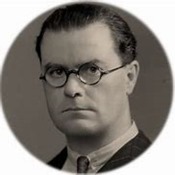 Archibald Gordon Macdonell (3 November 1895 – 16 January 1941) was a Scottish writer, journalist and broadcaster, whose most famous work is the gently satirical novel England, Their England (1933). Born in Poona, India, A. G. Macdonell’s family were Scottish. His father was a physician, and he was educated at Winchester where he excelled academically and at sports, representing the school at association football and golf. During World War I, he served for two years as a lieutenant of the Royal Field Artillery before being invalided out of the army, possibly because of shell shock. (Lieutenant Cameron, the protagonist of England, Their England is sent home for that reason.) The war had a profound effect on him, as it did with so many of his generation. Afterwards he spent two years in eastern Europe, firstly on the reconstruction of Poland, and then on famine relief in Russia. In 1922 he joined the League of Nations where he spent five years. Politically, he was a supporter of the Liberal Party. During 1923 and 1924 he unsuccessfully contested Lincoln as the Liberal candidate.
Archibald Gordon Macdonell (3 November 1895 – 16 January 1941) was a Scottish writer, journalist and broadcaster, whose most famous work is the gently satirical novel England, Their England (1933). Born in Poona, India, A. G. Macdonell’s family were Scottish. His father was a physician, and he was educated at Winchester where he excelled academically and at sports, representing the school at association football and golf. During World War I, he served for two years as a lieutenant of the Royal Field Artillery before being invalided out of the army, possibly because of shell shock. (Lieutenant Cameron, the protagonist of England, Their England is sent home for that reason.) The war had a profound effect on him, as it did with so many of his generation. Afterwards he spent two years in eastern Europe, firstly on the reconstruction of Poland, and then on famine relief in Russia. In 1922 he joined the League of Nations where he spent five years. Politically, he was a supporter of the Liberal Party. During 1923 and 1924 he unsuccessfully contested Lincoln as the Liberal candidate.
Macdonell made his living as a journalist in London, principally writing stage reviews for the London Mercury. In 1933, he became famous with the publication of England, Their England. The book gained considerable critical and popular acclaim, and won the James Tait Black Award that year. Today, Macdonell is remembered mostly for this one book. It is regarded as one of the classics of English humour and is much loved by readers for its evocation of England between the wars. It is particularly cherished by devotees of cricket for its famous description of the village cricket match. Although the rest of his books have been largely forgotten, several of them earned accolades during his lifetime. Macdonell was also a connoisseur of military history, and wrote a historical study called Napoleon and his Marshals (1934).
Archibald Gordon Macdonell (1895-1941), known popularly as A. G. Macdonell, wrote detective, adventure and military fiction under his own name and two pseudonyms. Macdonell began his writing career as a journalist, writing mostly theater reviews for London Mercury. In 1933 his novel England, Their England received the James Tait Black Memorial Prize, and it is this book for which he is most likely best remembered. Another satirical novel The Autobiography of a Cad (1938) has garnered something of a cult reputation lately. In addition to novels and a handful of plays he wrote at least one book on military history.
Macdonell also wrote six mystery novels under the name ‘Neil Gordon’, one of them,The Bleston Mystery (1928), in collaboration with Milward Kennedy. He also wrote under the pseudonym ‘John Cameron’.
Macdonell was a regular contributor to The Observer, and also a well-known broadcaster for the BBC Empire Service. He was a keen sportsman and a first-rate golfer, representing the Old Wykehamists on a number of occasions. He died suddenly in Oxford in 1941 at the age of 45. In his obituary, The Times called him “one of the leaders of the younger school of satirical novelists”. (Excerpts from Wikipedia)
As Neil Gordon he wrote: The Bleston Mystery (1928) in collaboration with Milward Kennedy, one of the founders of the Detection Club, The Factory on the Cliff aka The New Gun Runners (1928), Professor’s Poison (1928), Silent Murders (1929), The Big Ben Alibi (1930), Body Found Stabbed (1932), and The Shakespeare Murders (1933). Under the pen name “John Cameron” he wrote two other detective novels with similar sounding titles: Seven Stabs (1929) and Body Found Stabbed (1932).
Read more about A. G. Macdonell here.
The Factory on the Cliff has been reviewed at Cross-Examining Crime.
The Silent Murders has been reviewed, among others at Pretty Sinister Books, The Invisible Event, and The Grandest Game in the World
(Source: Facsimile Dust Jackets LLC. Arthur Barker (UK), 1933)
Writing under the pseudonym Neil Gordon, A. G. Macdonell wrote several crime and thriller novels. In the classic genre of ’20s and ’30s crime fiction, Macdonell managed to introduce a different element, unusual twists that keep the reader captivated and anxious to discover what came next. The Shakespeare Murders is another example of Macdonell’s carefully thought-through detective stories, where the detective is aided by the star of the cast. Peter Kerrigan saw a pickpocket take the wallet of a shabby little man, and with speed and precision he stole from the thief. Peter was a handsome gentleman-adventurer – not too scrupulous – and before he returned the pocketbook he read the letter which it contained. It was so that he heard of the million pound treasure, and began the search which was to lead him through so many horrors. At Marsh Manor he found the police trying to solve a murder, and lent somewhat grudging assistance; three more violent deaths followed rapidly. The working out of the solution to the mystery, and the final disposition of the treasure are brilliantly satisfying. The strictly logical framework of the book is filled in witty and entertaining fashion with strange and amusing characters. Macdonell uses his usual skill, well-dosed with ingenious twists, and a fast moving story-line, to keep the reader riveted to the book. Chase, conspiracy, and American gangsters add to the excitement of solving the Shakespeare riddle.(Source: Fantastic Fiction)
The Shakespeare Murders has been reviewed, among others, at Golden Age of Detection Wiki, Bedford Bookshelf, Happiness is a Warm Book, and Clothes in Books.


One thought on “A. G. Macdonell (1895 – 1941)”